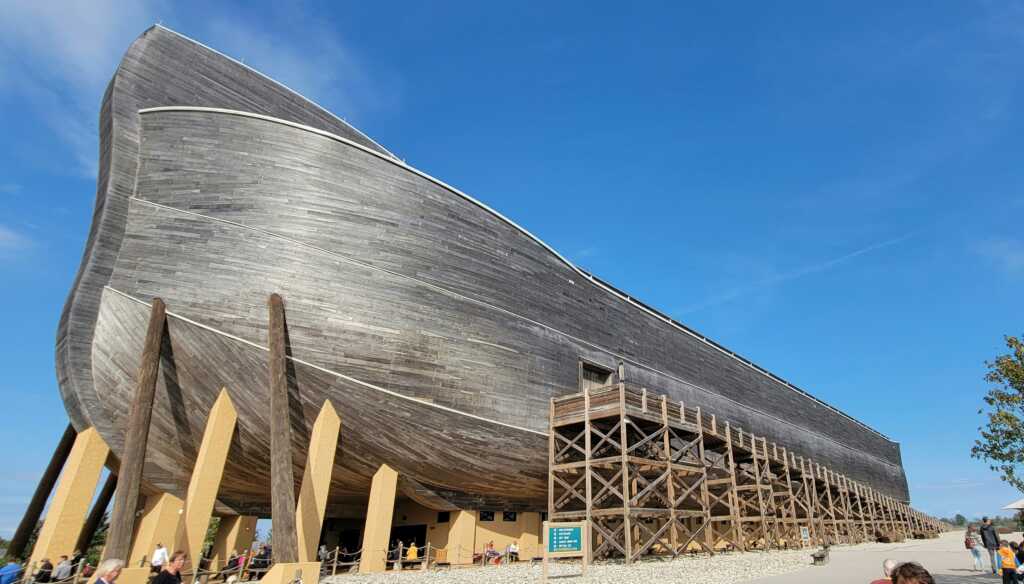A theologian who sparked an intense social media debate when he posited the Bible’s Noah’s ark narrative was potentially speaking about a regional — and not a global — flood is now speaking out to offer further context on his theory.
Listen to them on the latest episode of “Quick Start” 👇
Gavin Ortlund, president of Truth Unites, told CBN News he initially made his argument in a highly watched social media video, explaining his belief the Genesis 6 narrative is “about a regional event that was in a huge area of the Earth, but not all over the globe.”
“I just wanted to help people understand some of the arguments for that view — help people understand that there actually are differences within orthodox Christianity,” Ortlund said. “Historically, a lot of people are not aware of that.”
The theologian said the issue of Noah’s ark often poses problems for skeptics and those within the Christian community who are scientifically minded. Ortlund said he’s motivated to help people understand complex views around some of the more complex and debated issues.
Watch him discuss:
As for Ortlund’s own beliefs, he said he tends to lean toward thinking the flood was “local or regional,” noting, though, he doesn’t necessarily believe it was small in scope, even if limited to a particular geographic area.
In the end, he said, the debate boils down to how one interprets the story of Noah in Genesis. One of the factors, according to Ortlund, was the confined nature of humanity at that time.
“There really is a good case, actually, that, in its original meaning, the author and the original hearers wouldn’t be thinking of … all of the globe of planet Earth, so this is just a matter of interpreting Scripture,” he said. “Humanity, at this point, appears to also have just been regional. This is before the dispersion of human beings that happens after the tower of Babel and Genesis 10 and 11, so all of human beings are in this one portion of the Earth at this point before they had dispersed throughout the world.”
Ortlund said his initial video discussing the issue sparked many responses on YouTube and an overwhelmingly negative reaction on X, formerly known as Twitter.
Despite the reaction, he said there have been some traditional Christians in the past who have made this very same argument. While admitting these perspectives constitute a collective minority view, he added his belief that some people today simply don’t realize such claims have historically existed.
Ortlund also pushed back on the notion he’s a theological liberal or somehow espousing beliefs not rooted in Scripture.
“I’m an evangelical Christian,” he said. “I believe in biblical inerrancy. I think the Scripture is fully trustworthy. I think if people were to go down the line on … the average sort of testing issues of our times, they’d find me pretty conservative, pretty classically Christian in my instincts.”
Among other issues, Ortlund cited the fact that Bible writers likely didn’t know about American continents, among other bits of information surrounding the extent of planet Earth during the Genesis narrative.
“All of us are responding to the progress of science and knowledge about planet Earth and having to adjust our interpretation of Scripture accordingly,” Ortlund said. “Not because Scripture is not true, but because we’re trying to interpret, ‘What does the text mean in its original context,’ viewing the world from an ancient perspective and using language that reflected that perspective.”
He also argued that, in his view, there’s nothing that theologically changes in the Noah narrative if one embraces a regional over the global flood narrative.
“I don’t think anything of great theological consequence is at stake in the specific matter of the extent of the water,” he said.
It should be noted that Ken Ham’s Answers in Genesis ministry, among others, has pushed back on the notion of a regional flood.
“Whether the Flood of Noah was global or local in extent is a crucial question,” Answers in Genesis said in a statement. “This is because, ultimately, what is at stake is the authority of all of God’s Word.”
The text continues, “Indeed, if the text of Scripture in Genesis 6–8 clearly teaches that the Flood was global and we reject that teaching, then we undermine the reliability and authority of other parts of Scripture, including John 3:16. God’s Word must be trustworthy and authoritative in all that it affirms.”
Read more about that argument here.
***As the number of voices facing big-tech censorship continues to grow, please sign up for Faithwire’s daily newsletter and download the CBN News app, developed by our parent company, to stay up-to-date with the latest news from a distinctly Christian perspective.***



